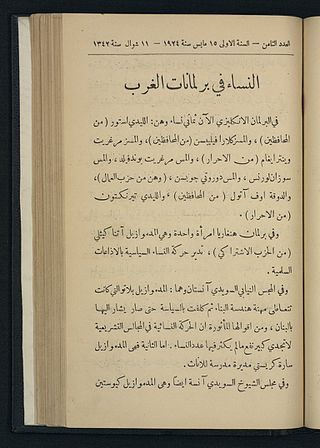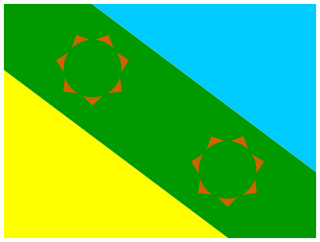
Khairallah Talfah, also known as Khayr-Allah Telfah, Kairallah Tolfah, Khairallah Tolfah, or Khairallah Tilfah, was an Iraqi Ba'ath Party official, and the maternal uncle and father-in-law of Saddam Hussein. He was the father of Sajida Talfah, Saddam's first wife, and of Adnan Khairallah, defence minister. Saddam appointed Khairallah Talfah mayor of Baghdad, but he was forced to remove Khairallah from office due to corruption.

Adnan Khairallah was an Iraqi military officer and Saddam Hussein's brother-in-law and cousin. He held several titles and was a member of the Iraqi Revolutionary Command Council. He also served as the Defence Minister of Iraq from 1979 until his death a decade later, being appointed days after Saddam Hussein succeeded to the Presidency.
Al-Muthanna ibn Haritha al-Shaybani was a Muslim Arab general in the army of the Rashidun Caliphate.
The National Union Front was an Iraqi nationalist political alliance formed in 1954 and re-established in 1956 as a coalition of the Ba'ath Party, the Iraqi Communist Party, the Iraqi Independence Party, the National Democratic Party and later the Kurdistan Democratic Party. The alliance supported various Arab nationalist and liberation movements around the world, supporting the governments in Egypt and Syria and supporting the Algerian liberation movement. The party splintered and dissolved in the aftermath of the 1958 revolution led by Abd al-Karim Qasim after division across between Arab nationalists and Iraqi communists.
Abdullah Sallum al-Samarra'i was an Iraqi Ba'athist politician and leading member of the Arab Socialist Ba'ath Party in Iraq. He was a member of the Regional Command from 1964 to 1970, when he was expelled.

Abd al-Khaliq al-Samarra'i was an Iraqi Ba'athist politician and leading member of the Arab Socialist Ba'ath Party in Iraq. He was a member of the Regional Command from 1964 to 1973, and considered a serious rival of Saddam Hussein for leadership of the civilian faction of the Ba'ath Party. He was arrested in 1973 for his alleged involvement in a plot to overthrow the government, and executed in 1979 by Hussein.
Dindar Najman is an Iraqi Kurdish politician who is displacement and migration minister in the second cabinet of Nouri Maliki. He is one of the leaders of the Kurdistan Islamic union.

Layla was a first women's magazine published in Baghdad, Iraq, in 1923. It was published in the Arabic Language. The magazine which became the forerunner of the women's movement in Iraq ceased publication in 1925.

The Regional Command of the Arab Socialist Ba'ath Party – Iraq Region, officially the Regional Command of the Iraqi Regional Branch of the Arab Socialist Ba'ath Party, was the highest decision-making organ of the Ba'ath Party organization in Iraq. The Regional Command has normally had 19-21 members throughout its history. When in power, the Directorate of Security Affairs was responsible for the security of the president and the senior members of the Regional Command.
Salih Mahdi Ammash was an Iraqi historian, writer, author, poet and Iraqi Regional Branch politician and Iraqi army officer who sat on the Regional Command from 1963 to 1971.
Muthaffar al-Nawab or Muzaffar al-Nawwab was an Iraqi poet and political critic.
Manal Yunis is an Iraqi women's leader. She was among the leading figures of the Ba'ath Party during the rule of Saddam Hussein.
Mishkat Al-Moumin is an Iraqi lawyer and lecturer. She served as the Minister of Environment in the Iraqi Interim Government under Iyad Allawi (2004–05). After surviving several assassination attempts due to her advocacy for women's rights, she moved to the United States.
Suhaylah Abd-Jaafar is an Iraqi lawyer and human rights activist. She was appointed Minister of displacement and migration in Ibrahim al Jaafari's Iraqi Transitional Government (2005–06). She survived a car bomb attack in February 2006. Variations of her name include Suhaila Abd-Jaafar and Suhayla Abd-Jaafar.
Najiha Al-Amiri is an Iraqi politician and a member of the Council of Representatives of Iraq.

The Free Iraqi Forces (FIF) were a militia made up of Iraqi expatriates, who served in the 2003 invasion of Iraq and its aftermath, under the control of Ahmed Chalabi's Iraqi National Congress government-in-exile. The specifically paramilitary branch of the program was also known as the Free Iraqi Fighting Forces (FIFF), while other elements served as interpreters or on civil affairs projects.
Mawlud Mukhlis, born in Mosul in 1886 and died in Beirut, Lebanon in 1951, was an Arab nationalist, soldier and Iraqi politician. He headed the Chamber of Deputies of Iraq from December 1937 to November 1941.
The Chamber of Deputies of Iraq was the elected lower house of the bicameral parliament established by the Mandatory Iraq's 1925 constitution. There were initially 87 deputies, who were elected The Chamber of Deputies remained in existence until the 1958 revolution. The number of deputies was later increased to 141.
Pauline Hassoun was an Iraqi journalist and teacher, who was the first woman to found and publish a magazine in Iraq.






